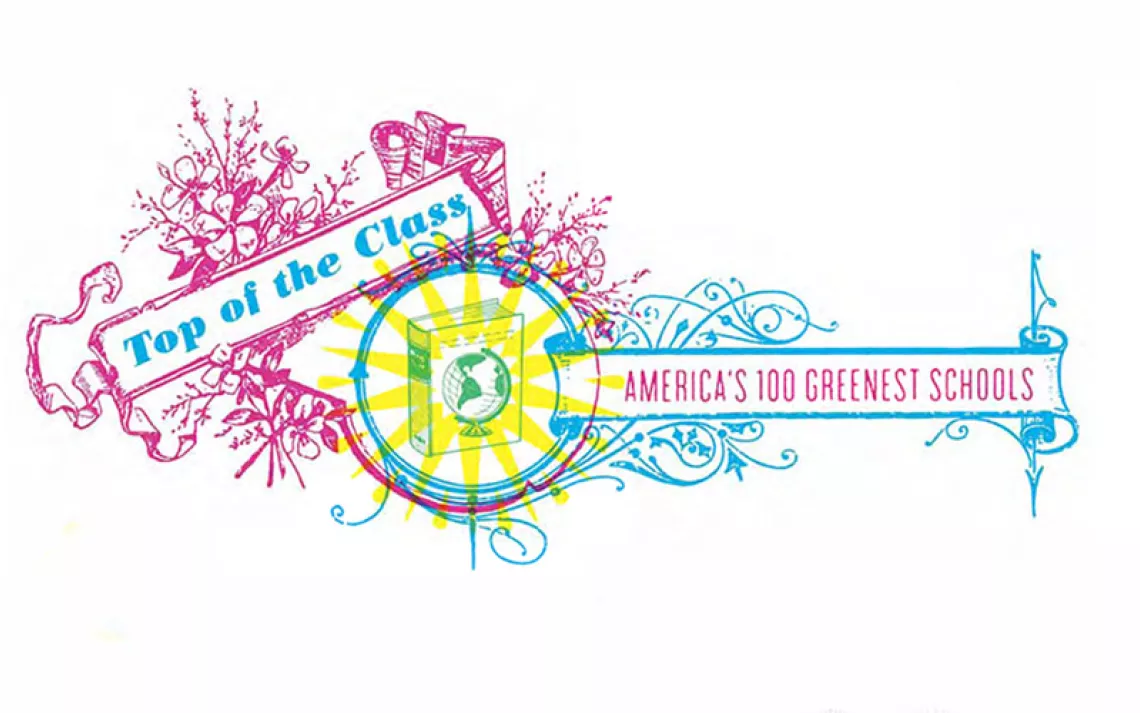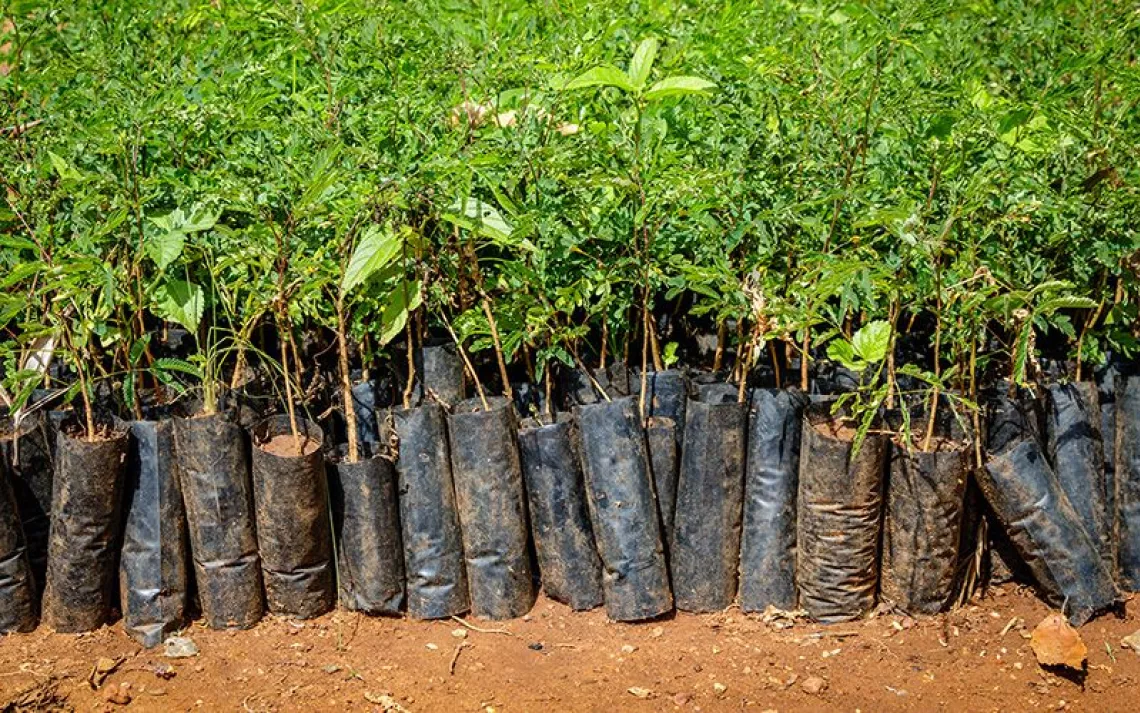The Top 20 Coolest Schools 2019
Here's how the greenest colleges of the year earned an A+
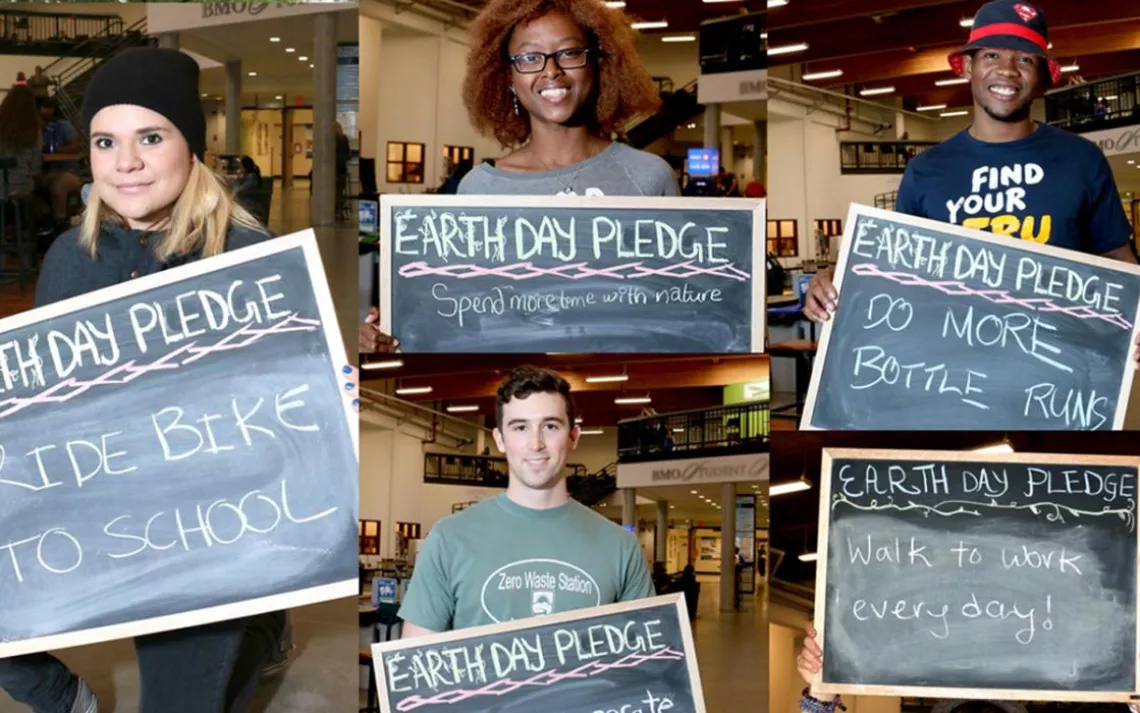
Thompson Rivers University scored first place in Sierra's 2019 Cool Schools ranking. | Photo courtesy of Thompson Rivers University
The Top 20 | Infographic | All 282 Schools Ranked | Methodology | FAQ | More Cool Schools
For 13 years, Sierra has been ranking colleges according to which ones offer the best sustainability-focused courses, ecofriendly cafeteria provisions, and carbon-neutral land and energy policies, as well as the most opportunities to engage with the environmental movement. Since 2007, sustainability measures that once seemed cutting-edge have become the norm, and we've seen schools effect real change across their communities, regions, and states. This year, a record 282 schools vied to become the eco-savviest in all of academia. Please join us in congratulating the tremendously cool—and diverse—schools topping their class in the most crucial subject of all.
20: University of Illinois at Urbana-Champaign
Score: 75.92 | Urbana and Champaign, Illinois

At the University of Illinois at Urbana-Champaign, the McKinley Health Center became a gold-certified Green Office. | Courtesy of University of Illinois Urbana-Champaign
The Fighting Illini's Student Sustainability Committee operates one of the largest campus green funds in the nation, channeling $1.2 million annually toward green projects. In 2018, U of I ushered in its first cohort of Teaching Sustainability Fellows—faculty tasked with building sustainability elements into existing courses and developing new environment-related classes. Students can earn certificates in environmental writing, use a campus bike-share program, and get certified for greening school events as well as sororities and fraternities. Since its 2016 inception, Illini Lights Out—a student group that traipses around campus turning off lights and shutting windows—has saved the school $17,000 and 143.6 metric tons of CO2-equivalent emissions.
19: University of Dayton
Score: 76.12 | Dayton, Ohio

Solar arrays will provide nearly 10 percent of the power for two buildings on the University of Dayton campus. | Courtesy of University of Dayton
The nation's first Catholic university to divest from fossil fuels is also a fair-trade-certified college. Last year, the Dayton Flyers broke ground on their "solar prairie": 2,805 photovoltaic panels arranged in an interactive, largely student-planned field. U Dayton recently launched two new sustainability degrees—the BS offers courses in energy, biology, geology, chemistry, and watershed management, while BA students can take food studies, urban sustainability, grant writing, philosophy, and data analysis. Students throw a Sustainability Week every fall—hosting speakers, films, hands-on workshops, and teach-ins—and a spring Greensweep, which is a half-day devoted to community cleanup.
18: Santa Clara University
Score: 76.13 | Santa Clara, California

Santa Clara University students show off their Mission Sustainable badges for auditing residence-hall waste. | Courtesy of Santa Clara University
Last spring, SCU turned all its sustainability goals and metrics into a publicly accessible interactive road map—then gamified it. Inspired by Project Drawdown, the game involves students and staff competing for badges in nine categories—including academics, purchasing, transportation, and food—by committing to, for example, one vegan meal a day, choosing carbon-free travel across campus, or taking a sustainability course. Leave it to a Silicon Valley–based school to understand the power of social networks—friends can nominate you for a badge, and students vie to collect all nine badges to display via their water bottles and email signatures. SCU faculty now hosts workshops with other schools' professors to help colleagues better integrate sustainability and place-based learning in the classroom.
17: University of Calgary
Score: 77.63 | Calgary, Alberta
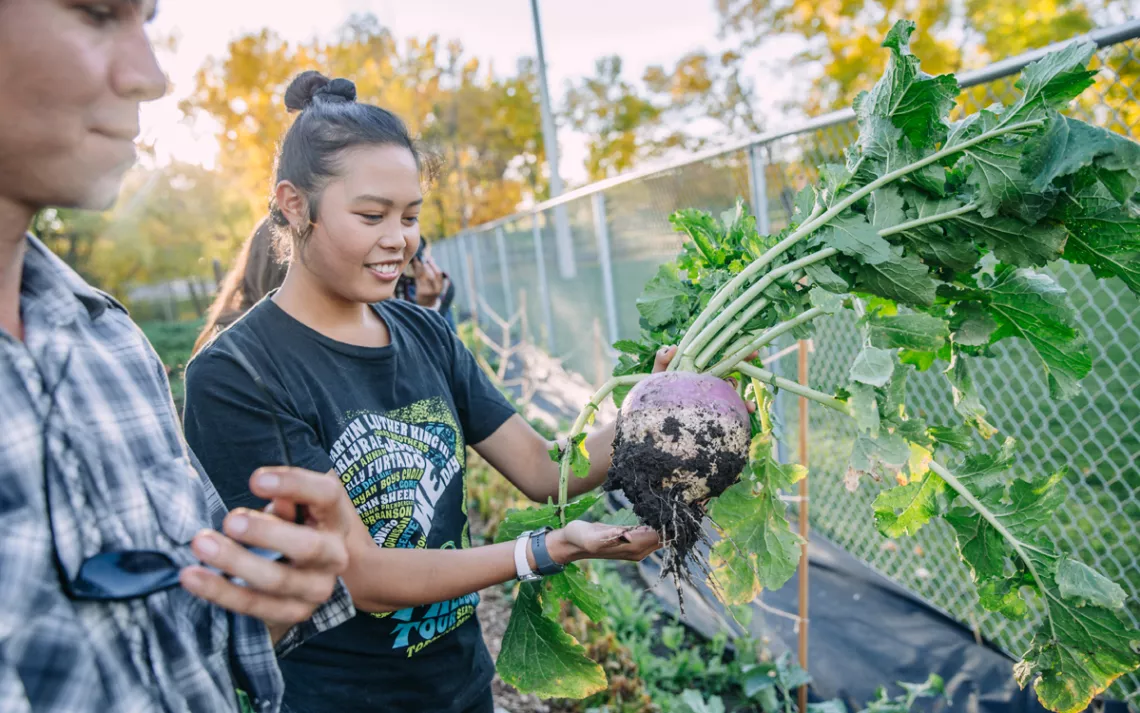
The University of Calgary offers Campus as a Learning Lab, which includes a community garden. | Courtesy of University of Calgary
No matter their major, the 30,000+ students at southern Alberta's largest university can choose from more than 400 sustainability-affiliated courses or go on to earn an Embedded Certificate in Sustainability by completing core and elective courses and a capstone project. The Dinos' ambitious 2019 Climate Action Plan—which calls for energy retrofits, an electrified vehicle fleet, and behavioral initiatives such as certification for Sustainable Offices and Sustainable Events—has the campus on track for 97 percent carbon neutrality by 2050. Ii’ taa’poh’to’p, UCalgary’s Indigenous Strategy, was developed with extensive community consultation and guidance from Elders in the region. Launched in 2017, the strategy presents a vision of Indigenizing ways of knowing, doing, connecting and being to transform the institution in the months and years to come.
16: University of California, Berkeley
Score: 78.47 | Berkeley, California

Produce grown for UC Berkeley's Browns herbal garden project will be used in a campus cafe. | Courtesy of University of California, Berkeley
Through a democratic voting process, the 42,000 students attending the UC system's flagship campus have opted to contribute to an annual Green Initiative Fund that provides $350,000 a year to more than 40 eco-centric student and staff groups. Students manage a re-use store where they help peers exchange textbooks and dorm goods, while others run an organic, fair-trade, locavore food collective. The Golden Bears are moving swiftly toward their goals of being zero-waste by 2020 and carbon neutral by 2025, thanks to plans to double solar installations in the next year, exclusively construct all-electric buildings in the future, and incorporate waste-disposal behavioral education into orientation and residential life.
15: College of the Atlantic
Score: 78.86 | Bar Harbor, Maine

College of the Atlantic students look for waterbirds at Acadia National Park. | Courtesy of College of the Atlantic
Early leaders in the fossil fuel divestment movement, the green minds behind the College of the Atlantic have set their sights on having a fossil-fuel-free, zero-waste campus by 2030. To that end, students have organized a Break Free From Plastic pledge (it's why you'll find broken fettuccine noodles moonlighting as coffee stirrers in the COA dining hall, where all waste is referred to as "discarded resources"). This fall, COA breaks ground on a new Center for Human Ecology, built according to German Passive House standards—meaning it's designed to be largely heated by the human bodies inside and to use 80 percent less energy than other buildings. COA students run a robust Share the Harvest program to distribute the fruits of their two organic farms.
14: Chatham University
Score: 79.01 | Pittsburgh, Pennsylvania
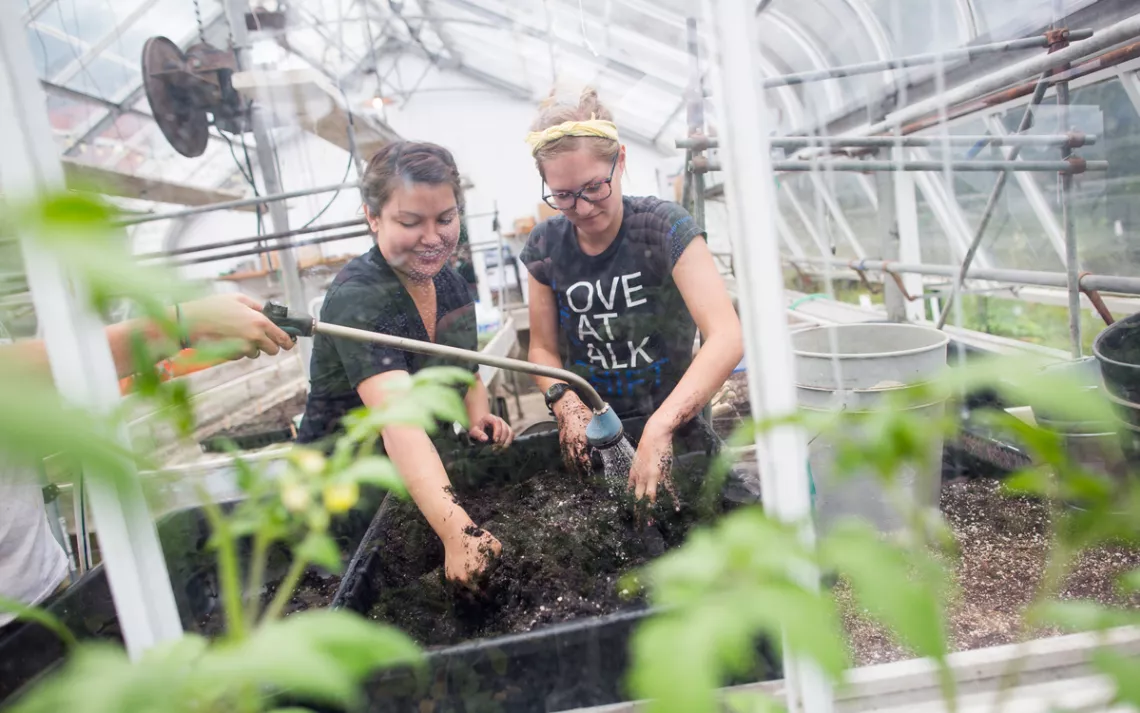
Students at work in a greenhouse at Chatham University. | Courtesy of Chatham University
A green beacon in the heart of coal country, Chatham's electricity footprint is now net-zero, thanks to renewable energy credit purchases, on-site solar generation, and an LED lighting retrofit. In the past year, students teamed up with the Greater Pittsburgh Community Food Bank to grow crops in the campus garden and solar-thermal greenhouse. The school has introduced both a BA and BS in sustainability, but environmental topics permeate all curricula: Psych majors, for instance, take courses in environmental psychology, and nursing students study air and water quality and pollution. In honor of its 150th anniversary this year, Chatham plans to show off its resilience in the form of its leafy, carbon-storing canopy by planting 150 trees.
13: Seattle University
Score: 79.41 | Seattle, Washington
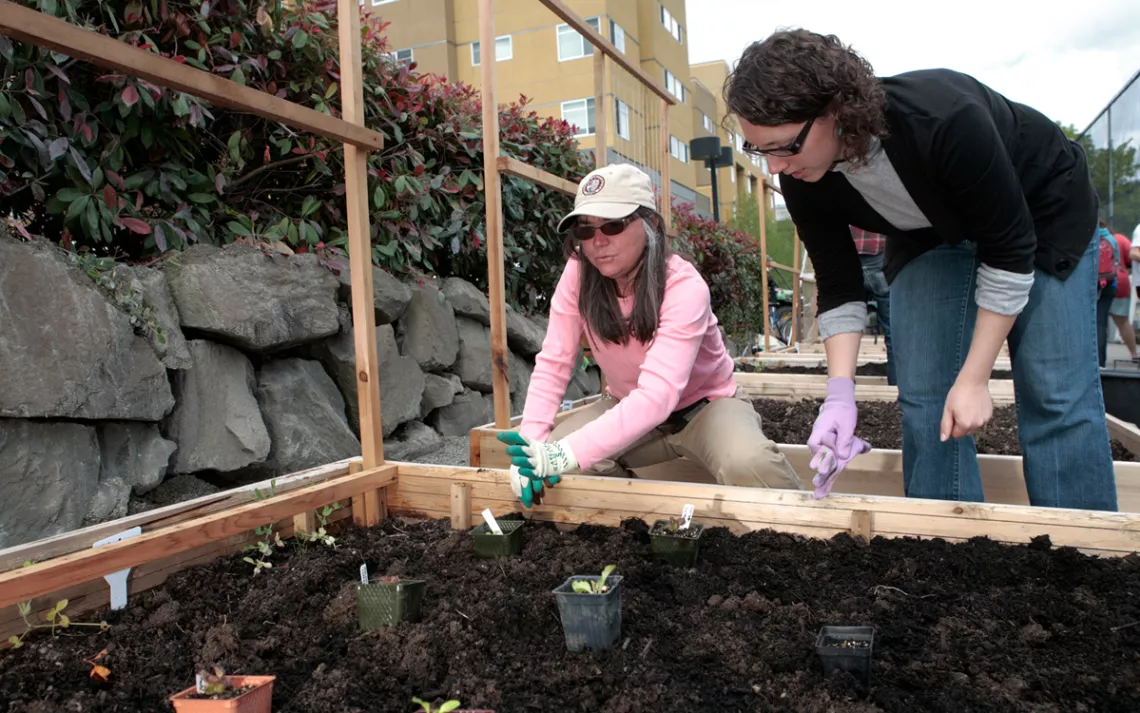
Seattle University has been composting its food waste for 15 years. Students and community members can graze at several "edible gardens." | Courtesy of Seattle University
Last year, Seattle University's board voted to fully divest from fossil fuels within five years. The school also reduced water use by 25 percent thanks to low-flow showerheads and sink aspirators (saving some $100,000 and 4 million gallons). After a waste management audit revealed the Redhawks weren't always using the correct bins, the school held a rowdy recycling rally, and student Eco Reps doubled down on disposal education in the dorms. Seattle U's pesticide-free grounds are nourished with compost made from pre-consumer dining hall food waste, and its faculty and students are now busy planning a Climate Justice summit for 2020.
12: Dickinson College
Score: 80.67 | Carlisle, Pennsylvania

Dickinson College students and local residents ride together to promote bike safety. | Courtesy of Dickinson College
This was the first year Dickinson required graduates to complete a course in sustainability, but more than half of students already choose to take four or more. They pursue certificates in food studies and social innovation and entrepreneurship, and live their greenest lives in a new LEED Platinum–certified dorm that piloted the school's first Residential Life Sustainability program (now open to students in all dorms). The campus organic farm has been nourished with dining hall compost since 2000; now Dickinson is aiming to slash the supply of dining-hall-derived compost by cutting food waste via a new Pick Your Portion initiative that lets students opt for "taste" or "half" servings of menu items. At orientation and sustainability events, Dickinson's red devil mascot is joined by, you guessed it, a green devil.
11: Sterling College
Score: 80.86 | Craftsbury Common, Vermont
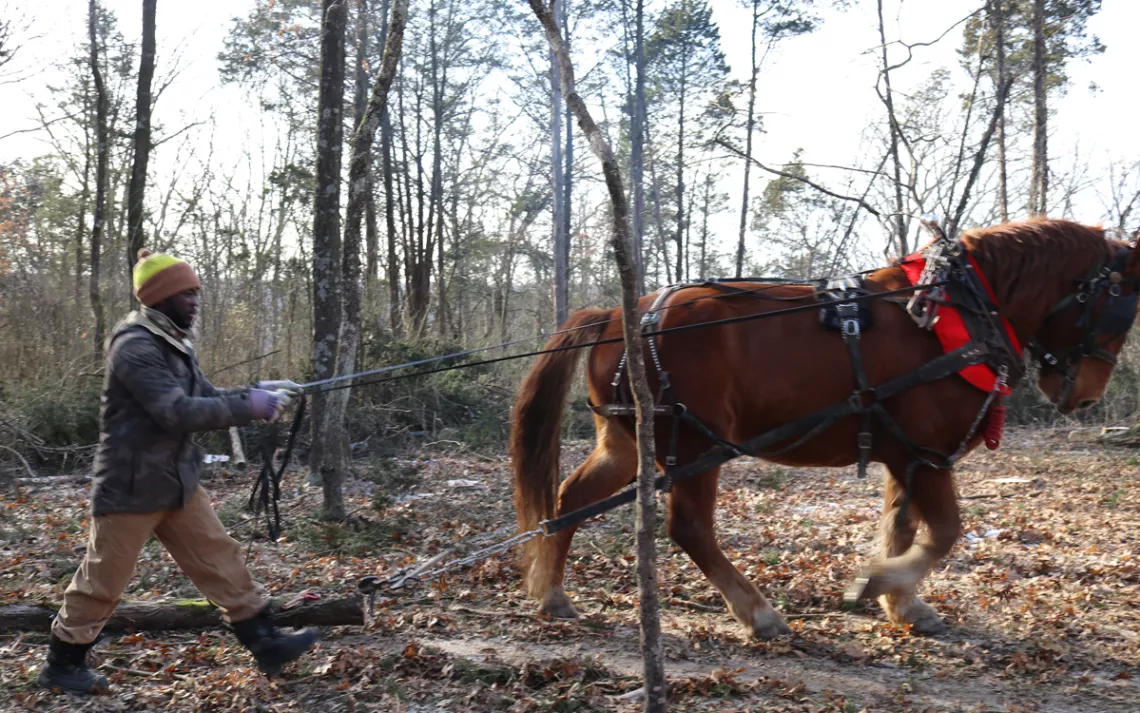
Harnessing horse power in the Wendell Berry Farming Program at Sterling College. | Courtesy of Sterling College
Call up the home page for Sterling College, and in the space where most schools promote their sports and campus aesthetics, this federal work college in Vermont states, "This Is a Climate Emergency." The 120-student school just released a 10-year strategic plan that aims to combat a consumption- and extraction-reliant economy. Sterling students can engage in ecological fieldwork via semester-long wilderness immersion programs and implement regenerative, holistic farming practices in Kentucky, thanks to a unique new partnership with The Berry Center in Henry County, Kentucky. Students grow about 20 percent of food served on campus, and popular courses include Winter Ecology, Watersheds and Plant Science, and Fiber Arts and Woodworking.
10: Arizona State University
Score: 81.04 | Tempe, Arizona
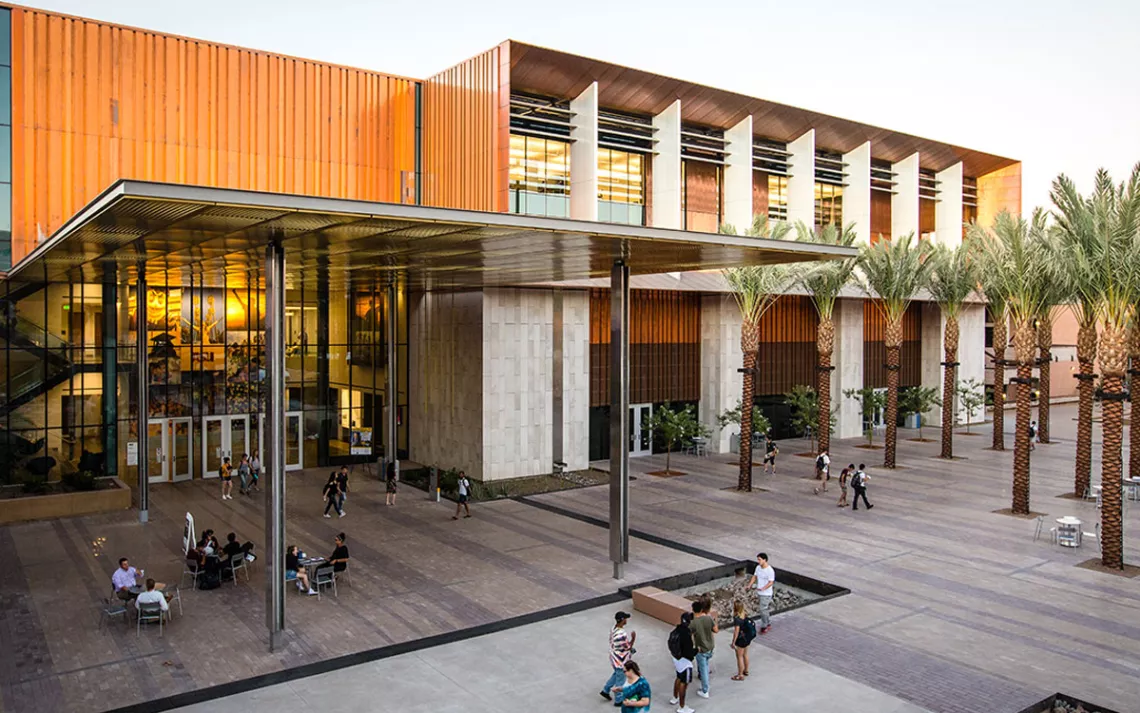
The Student Pavilion at Arizona State University is zero-waste and uses renewable energy. | Courtesy of Arizona State University
In the past 18 months, the Sun Devils implemented a climate-neutral policy for new-building construction and took a fair-trade pledge, becoming the nation's largest campus to commit to selling, using, and providing education about fair-trade goods. Not only do students and employees enjoy subsidized EV charging stations, but the university has also negotiated discounts for students and employees who buy or lease EVs. ASU researchers recently developed a 3D mapping radar system that determines when coral reefs are about to bleach, while students led the charge to retrofit 60 buildings' plumbing with low-flow urinals and efficient toilets. The university recently introduced majors in sustainable food systems and business sustainability.
9: Colorado State University
Score: 81.22 | Fort Collins, Colorado
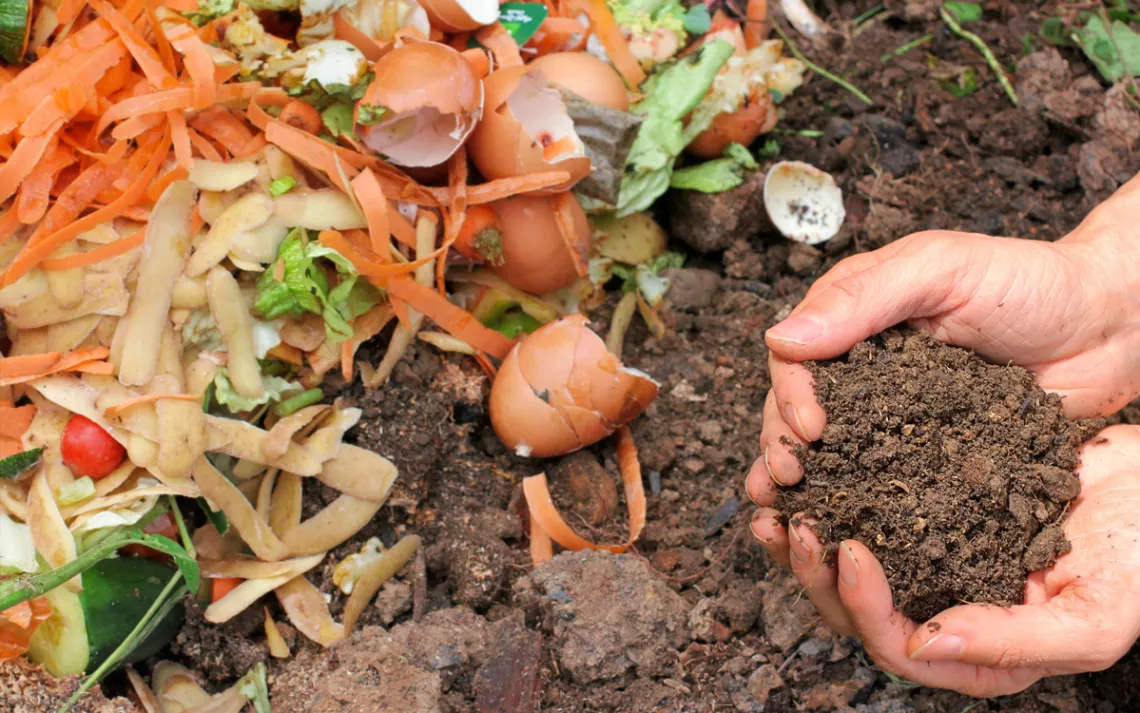
Colorado State University has been composting since 1995. | Courtesy of Colorado State University
Long regarded as one of the bike-friendliest colleges, Colorado State became pollinator-friendly too in 2018, nabbing Bee Campus USA certification (which requires habitat plans and pollinator-awareness events). The Rams partnered with Fort Collins to commit to becoming 100 percent renewable energy powered by 2030 and took a bite out of food waste with a new program through which food-insecure students receive text alerts to pick up leftovers from catered campus events. Students can choose from among 962 environmental courses, and last year Colorado State added cool new minors: sustainable energy and sustainability in peace and reconciliation.
8: Middlebury College
Score: 81.99 | Middlebury, Vermont
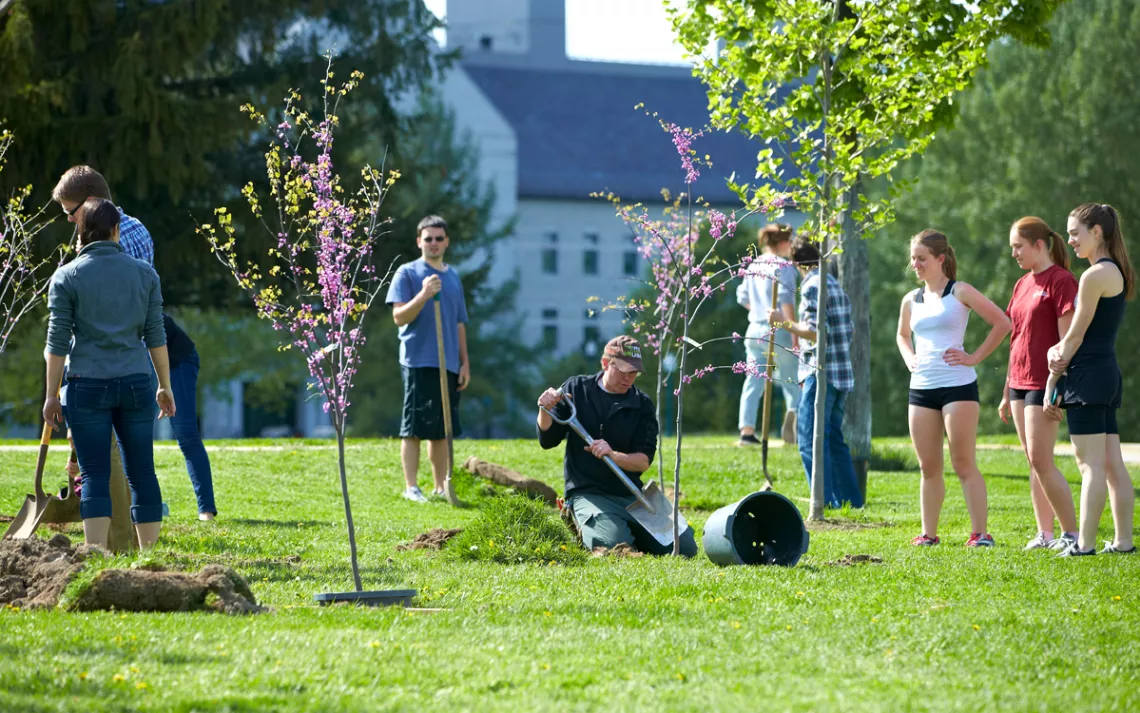
Students participate in a tree-planting event for Arbor Day at Middlebury College. | Courtesy of Bob Handelman/Middlebury
What's next for the school that met its carbon-neutrality goal (early) in 2016? Middlebury's largely student-initiated Energy2028 plan calls for a complete divestment from fossil fuels and for the school to become 100 percent powered by renewables by 2028. Its Global Partnerships for Sustainability program, which launched in 2016, pairs study-abroad students from Middlebury and other schools with governmental and nonprofit environmental initiatives; this year, the school added programs in Russia, Uruguay, and China, where students are helping to protect potable water in an intensively farmed watershed. Back on campus, students have gotten local merchants on board with a program that grants discounts to students who take the bus.
7: Colby College
Score: 83.62 | Waterville, Maine
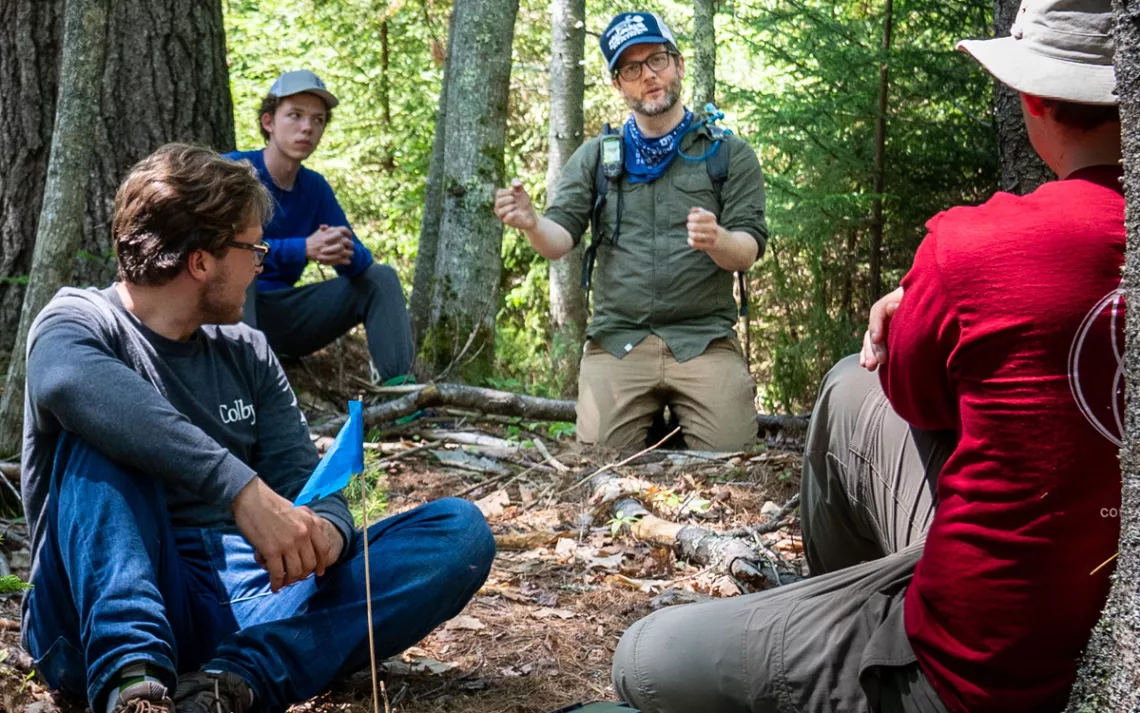
Colby College assistant professor of environmental studies Justin Becknell teaches forest ecology. | Courtesy of Colby College
Colby has 16 (and counting) LEED-certified buildings and was the first New England school to attain US Green Building Council certification for sustainable landscapes, thanks largely to its athletic fields, which boast native plants and are situated atop stormwater basins. This past year, paid student EcoReps pitched, funded, and launched a campus bike-sharing app; audited dorm waste bins; and spearheaded a campus-wide electricity-saving challenge. Students also launched a campus chapter of the Citizens' Climate Lobby to better engage with local and federal policymakers and rally their community around climate action.
6: University of California, Merced
Score: 83.68 | Merced, California
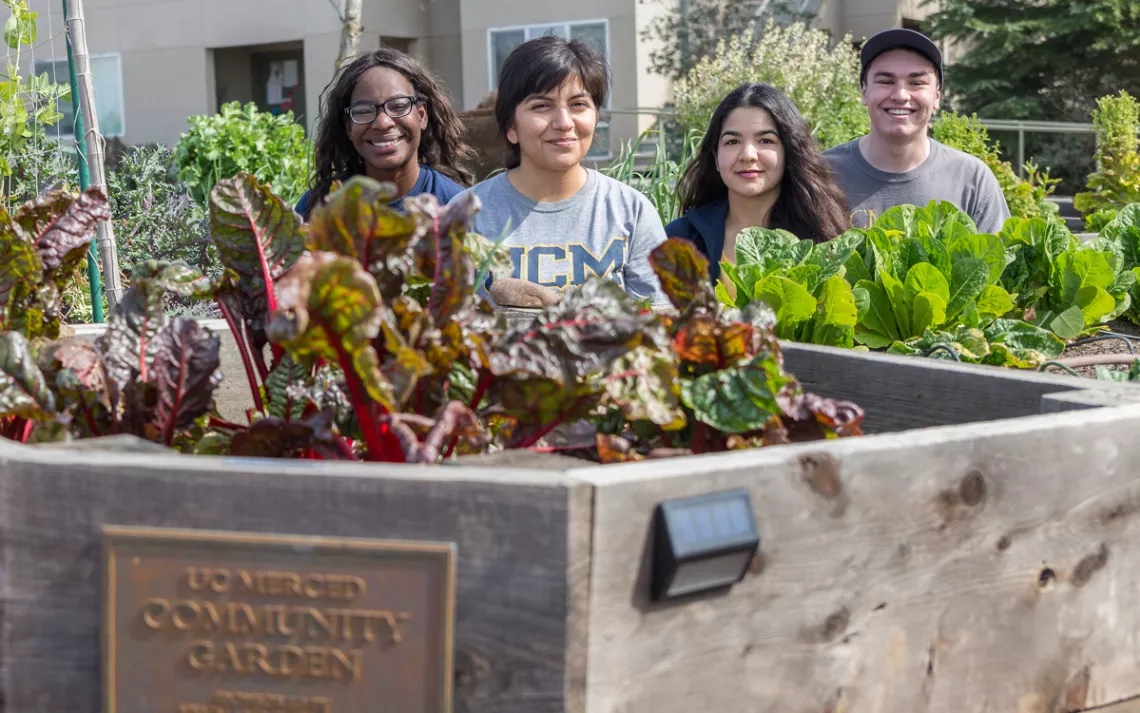
At UC Merced, students are allowed to pick their own produce from the community garden on designated harvest days. | Courtesy of UC Merced
The UC system's newest campus is the nation's only university with exclusively LEED-certified buildings. UC Merced is on track to be zero-waste and to source half its electricity from on-site solar by 2020. To graduate, students must earn a sustainability badge through coursework or extracurricular activities, which helped spur the launch of an organic garden (the fruits of which support food-insecure students) and Carson House, a special dorm for students interested in the environment. The popular summer Yosemite Leadership Program helps students sharpen their environmental advocacy chops in the iconic national park, where they partake in wilderness outings and develop and implement conservation projects.
5: University of Connecticut
Score: 83.76 | Storrs, Connecticut
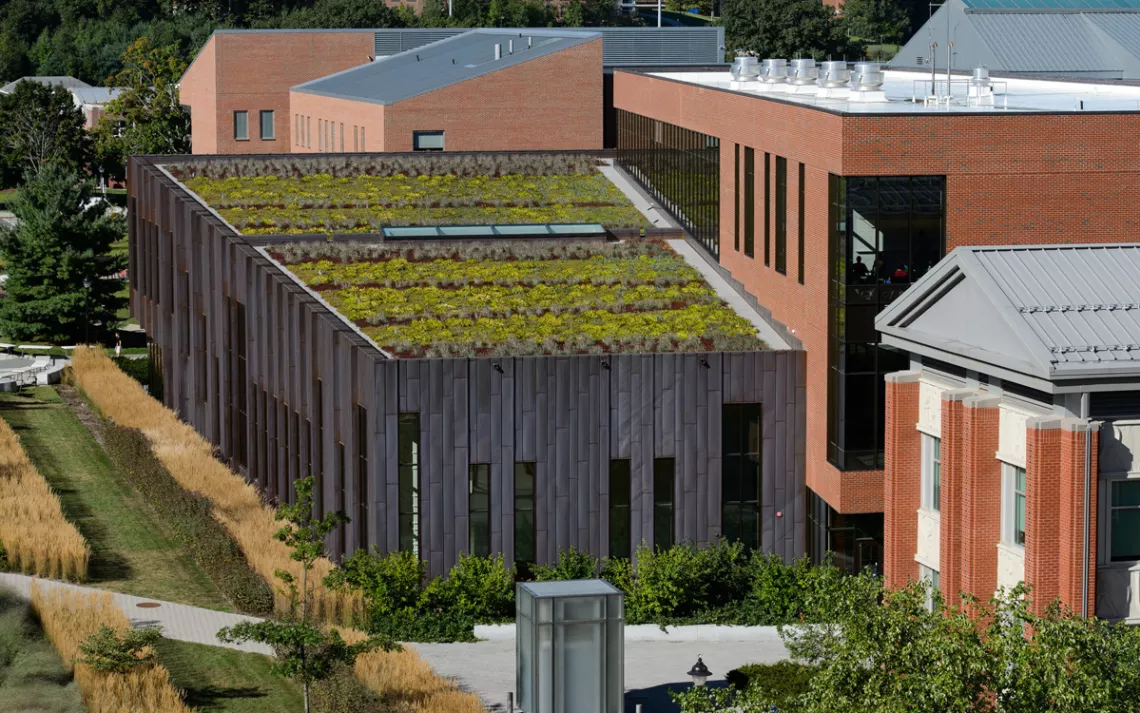
A green roof on a LEED-certified building at the University of Connecticut | Courtesy of University of Connecticut
Thanks to a new environmental literacy general education requirement, every UConn student must earn three credits from among 26 sustainability-related offerings—which include History of the Ocean and Toxic Chemicals and Health—in order to graduate. Next year, the food waste from all eight dining halls will be hauled to a local anaerobic digester to be reincarnated as compost and fuel for electricity generation. Fifteen UConn students traveled to Poland to meet with dignitaries and fellow youth delegates at COP24. And during last year's hunt for a new UConn president, students successfully petitioned search committees to consider only candidates with a demonstrated commitment to sustainability.
4: University of New Hampshire
Score: 84.30 | Durham, New Hampshire
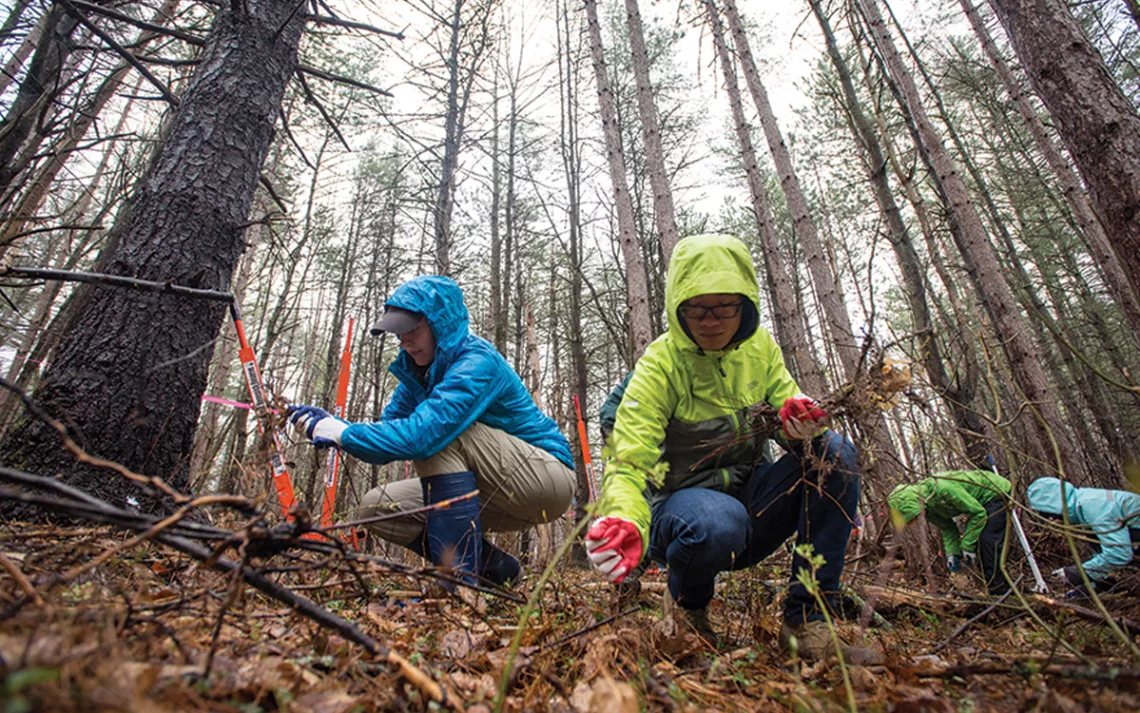
University of New Hampshire students remove invasive buckthorn from College Woods. | Courtesy of University of New Hampshire
The school with the nation's first campus sustainability office is progressing toward fossil fuel divestment, having last May completed the transition of 16 percent of its assets into ESG (environmental, social, and governance) investments. Selected Wildcats partake in UNH Sustainability Fellowships, through which they get paired with municipal and NGO partners to work on initiatives like assessing cities' carbon and nitrogen footprints and retrofitting historic buildings. When last October's IPCC report dropped, UNH's undergrad, grad, and faculty senates passed unanimous resolutions to cut greenhouse gas levels in accordance with the UN panel's recommendations. UNH dining halls' signature dish? It's the 60-40 mushroom-beef "blended burger."
3: SUNY College of Environmental Science and Forestry
Score: 86.21 | Syracuse, New York
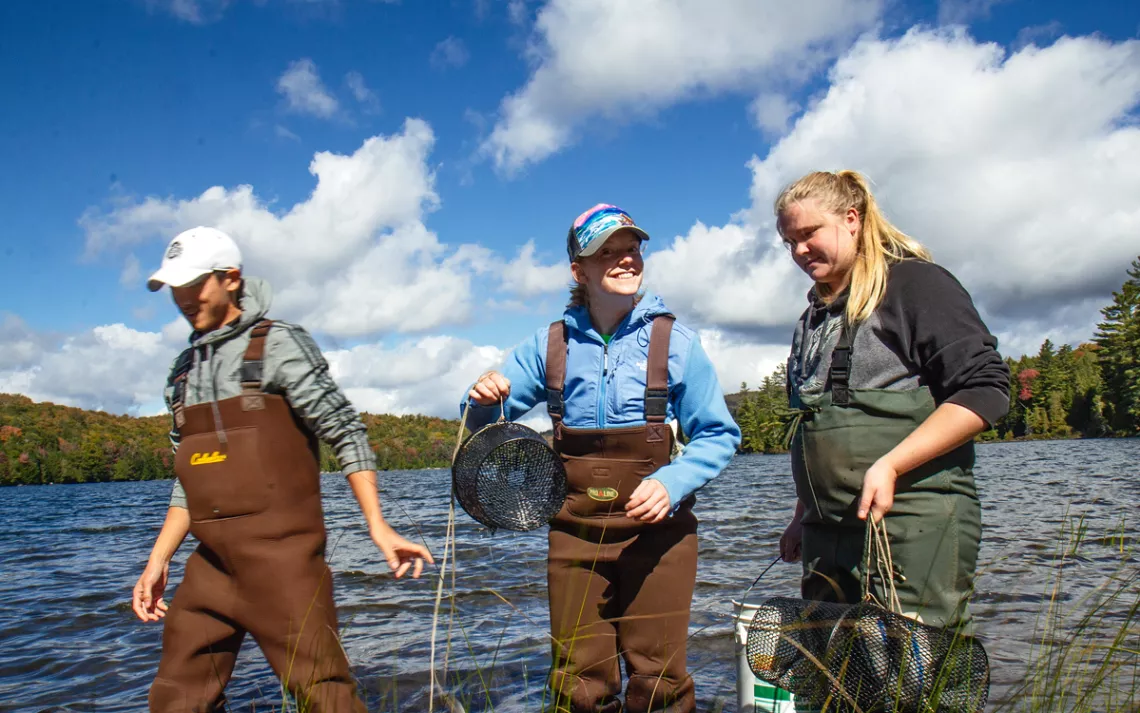
SUNY College of Environment and Forestry students in the fisheries science program assess fish populations and diversity in a university-owned lake in the Adirondack Mountains. | Courtesy of State University of New York College of Environmental Science and Forestry
Since 2017, the coolest school within the country's largest public university system has funneled energy-conservation savings into a fund for campus sustainability projects. This past year, SUNY-ESF's proven model inspired a scaled-up version of the fund for the entire SUNY system as well as SUNY-wide carbon-neutrality and net-zero-waste goals. SUNY-ESF is also helping to develop solar and wind projects throughout New York State. On campus, students can be found studying Indigenous Haudenosaunee cultures' sustainable agriculture practices at the Center for Native Peoples and the Environment and helping scientists better articulate the climate crisis through the Digital Storytelling Studio.
2: University of California, Irvine
Score: 86.95 | Irvine, California
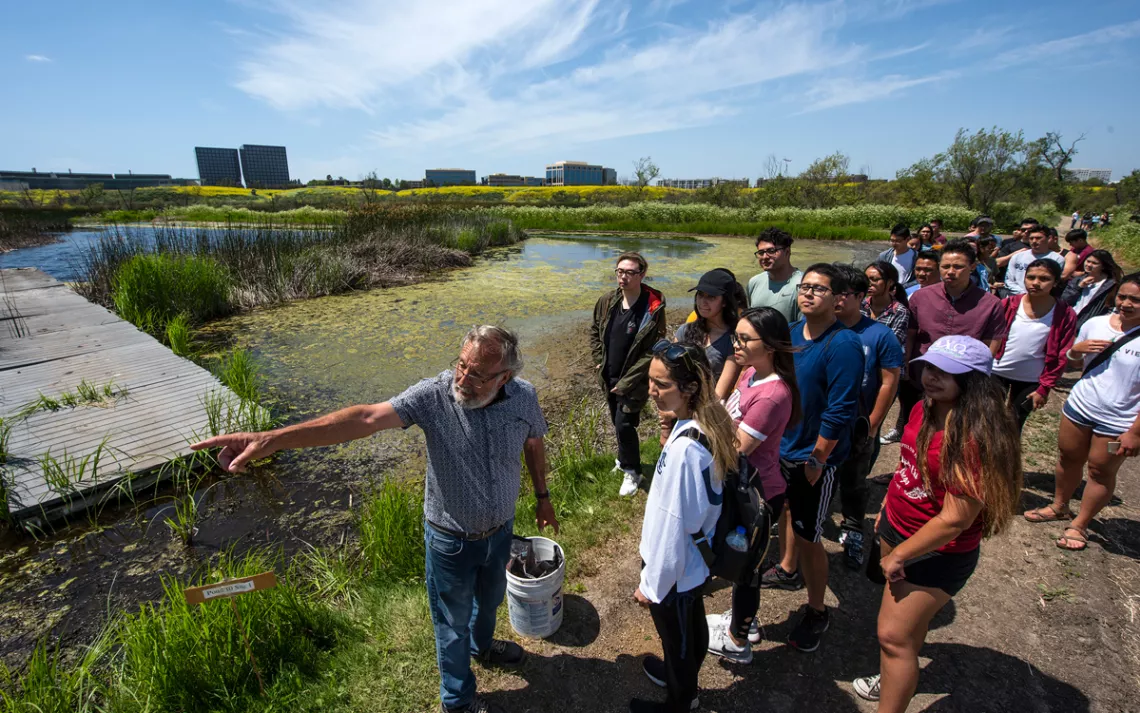
UC Irvine professor Peter Bowler leads students in his field freshwater ecology class in the San Joaquin Marsh during spring quarter. | Courtesy of University California, Irvine
Securing its 10th year of top 10 "cool" status, UCI has added more EV charging stations and finished converting its central-cooling plant to a system that conserves over 80 million gallons of potable water per year while cooling campus buildings—17 of which are certified LEED Platinum and seven of which are zero-waste facilities. One new school pilot project involves providing free insulation retrofits and solar installations in nearby low-income communities. UCI researchers are adapting medical and public health curricula to better prepare students to treat tropical diseases as they expand in range owing to climate change.
1: Thompson Rivers University
Score: 88.63 | Kamloops, British Columbia
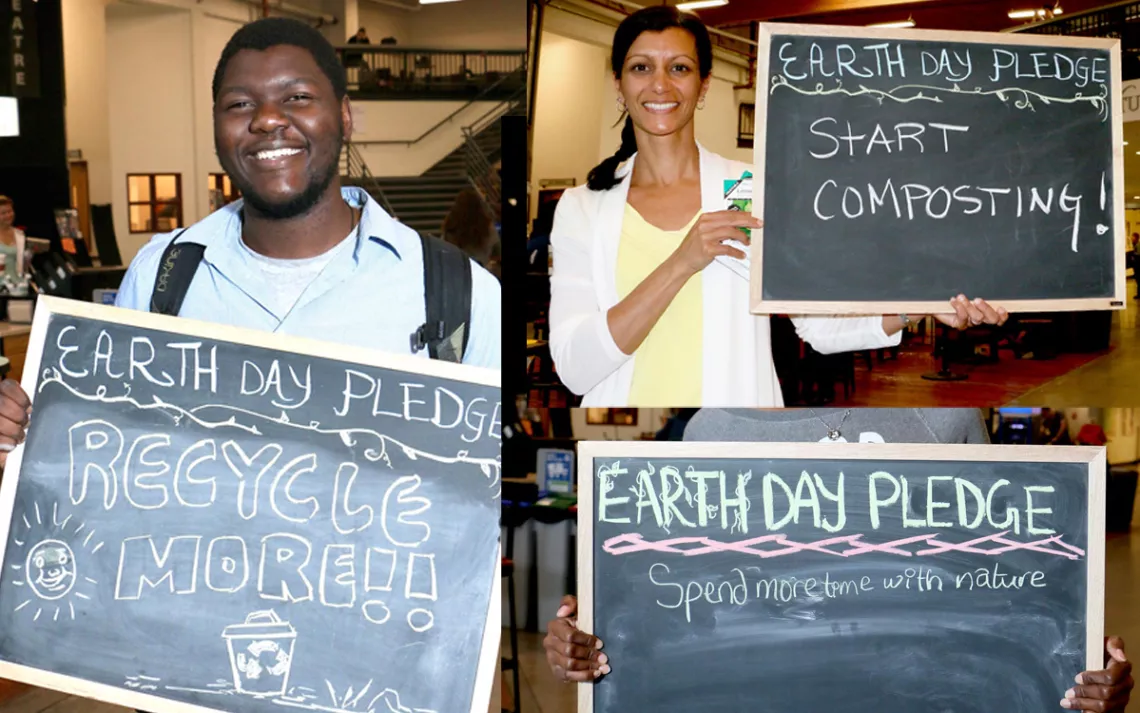
Thompson Rivers University students answer the question "What is your Earth Day pledge?" | Courtesy of Thompson Rivers University
The first Canadian school to top our ranking deserves kudos for diverting more than 70 percent of its waste stream away from landfills and avoiding fossil fuels for heating—no easy feat in chilly British Columbia. Thompson Rivers heats some buildings using a biomass system that burns waste wood and others with electricity produced from hydropower, wind, and solar. The 28,000-student university is also in the process of transitioning its entire vehicle fleet to electric or hybrid vehicles. At convocation, students with a Leadership in Environmental Sustainability certificate—earned through environmental engagement in and out of class, in tandem with any undergraduate or graduate program—receive special recognition. TRU rewards Sustainability Ambassadors, students who spearhead zero-waste initiatives and educate their peers on smarter consumption, with partial-tuition vouchers. How cool is that?
 The Magazine of The Sierra Club
The Magazine of The Sierra Club
